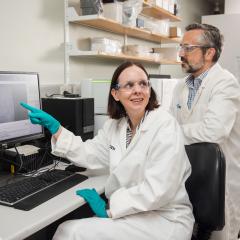A group of researchers at the School of Pharmacy have discovered two common mango varieties contain natural compounds that may help to fight flab.
Obesity is associated with many chronic conditions such as diabetes, coronary heart disease and several cancers, including those of the breast and colon.
In two of three mango varieties examined in the study, however, it was the mango peel that demonstrated the biggest fat-reducing potential … the bit that most people throw away.
The detailed analysis of three mango varieties was part of a collaborative research project between the School of Pharmacy and the Queensland Alliance for Agriculture and Food Innovation (QAAFI) as part of an Australian Research Council Linkage grant with the Queensland Government.
Dr Meng-Wong Taing, working on the project as part of his PhD with the School of Pharmacy, discussed the project on ABC radio (listen to the interview here):
"In order to test potential effects in the laboratory we used a cell-based test to assess fat accumulation in developing cells, which is a common process leading to weight gain and obesity.
"We looked at different varieties of mangoes and the differences between the peel and the flesh. In my study we chose three very different mango varieties: the Irwin mango, which has a characteristic purple blush and a beautiful honey aftertaste; the Kensington Pride or Bowen mango, known for its unique flavour; and the Thai cultivar Nam Doc Mai, used raw in Asian dishes, but also has a wonderful taste when ripe.
"We discovered that the flesh from all three mangoes does not affect fat accumulation. The peel, on the other hand, particularly from the Thai mango, had potent effects on fat accumulation, and therefore may aid weight loss." Dr Taing said.
Professor Greg Monteith from the School of Pharmacy said there were probably many reasons for this characteristic.
“A complex interplay of bioactive compounds unique to each peel extract is likely responsible for the difference, rather than just a single component,” he said.
The work conducted by Dr Meng-Wong Taing and his study’s results could help growers develop mango varieties that actively help reduce obesity."
"Mango Fruit Peel and Flesh Extracts Affect Adipogenesis in 3T3-L1 Cells”, M-W Taing et al, Food Funct., 2012. Full publication available here.


